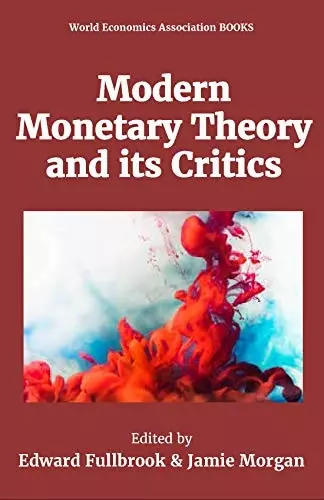Modern Monetary Theory and its Critics
Edward Fullbrook & Jamie Morgan
Modern Monetary Theory and its Critics Kindle Edition
Randall Wray, a longstanding advocate for MMT, opens this volume with a clear logical explanation of the MMT proposal that a sovereign state can issue money in which it also imposes the obligation of taxation. He dismisses the household or firm balanced budget requirement as a category error for a macroeconomy, but also rejects arguments that government budgets can be unconstrained and that ‘deficits don’t matter’. All contributors share a strong critique of austerity and inequality.
Trond Andresen suggests MMT can be implemented through an ‘electronic parallel money’, but also argues that this can ‘ensure employment of the entire population’ (p63). Phil Armstrong offers a devastating critique of interest rate monetary policy, pointing out that its effect on national debt interest can outweigh its effect on mortgage holders, and thus create the opposite effect on aggregate demand and inflation to its intention (p82). As Dirk Ehnts and Maurice Höfgen point out ‘neither taxes nor bond sales finance government spending’ (p161). Marc Lavoie and Louis-Philippe Rochon rehearse the often personal dispute between MMT advocates and post-Keynesians. Tony Lawson argues that money is not constituted as debt, but validated by community acceptance. Its ultimate referential is the productive output of the economy. Anne Mayhew perceptively questions whether deriving money value from taxation leaves it endogenous, and criticises the ‘sleight of hand’ whereby the Godley/Cripps sectoral balance identity is misused as a behavioural equation (p288). Richard Murphy questions whether taxation can be used effectively in demand management, although this seems to work currently. Tom Palley adds up the cost of MMT job guarantee, and green new deal proposals to show they cannot be funded by MMT money. Strangely there is no contribution from sovereign money advocates such as Joseph Huber.
MMT is purposive. It enables the funding of job guarantee and green new deal programmes. This gives it political meaning, significance and support, but questions MMT as pure theory per se. It is indeed logical that a sovereign state can issue money, and that the ‘backing’ imputing value to this money is neither gold, nor taxes, nor bond sales, but its reference to the output of the real production economy. MMT then insists that this money is quintessentially debt, but that this is balanced by other sectoral surpluses through the Godley identity in a questionable application. This insistence is puzzling and is nowhere justified, other by reference to its status as current practice. Issuing sovereign money debt-free would avoid the meaningless accumulation of national debt to multiples of annual GDP in the current model, and would relieve the economy of huge debt financing costs paid to the financial sector (£39bn/year in the UK economy).
Job guarantee programmes are fraught in their definition and may be rendered impossible by ever-advancing technology inexorably reducing the labour content of output. An alternative solution which the volume does not address is basic income (UBI) funded by debt-free sovereign money.
The book is available here.
Geoff Crocker
Editor ‘The Case for Universal Basic Income’
www.ubi.org

